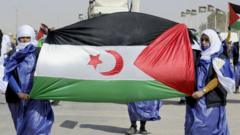The agreement includes plans for British businesses to engage in significant infrastructure projects related to the World Cup. These contracts, especially in health and transport sectors, signal not just a political alliance, but a mutual economic benefit. The UK’s shift in stance, however, suggests it will also require Morocco to uphold self-determination principles and update its autonomy strategy. Both nations reflect on their long-standing relationship, and Lammy emphasized the opportunities this new chapter could bring for UK companies in Morocco's development. Meanwhile, the UN's long-stalled referendum on the issue remains unresolved, underscoring the complexity of the region's historical conflicts.
UK Endorses Morocco's Western Sahara Autonomy Plan

UK Endorses Morocco's Western Sahara Autonomy Plan
The UK officially backs Morocco's sovereignty claim and autonomy plan for Western Sahara, marking a diplomatic shift.
In a recent announcement, UK Foreign Secretary David Lammy expressed support for Morocco's autonomy proposal regarding Western Sahara, a region with a longstanding territorial dispute. This backing is part of a broader strategy aimed at enhancing economic ties, especially in view of the upcoming 2030 men's football World Cup that Morocco will co-host. Historically, the UK maintained neutrality, but Lammy's visit to Rabat indicated a new direction in foreign policy, positioning Morocco's plan as "the most credible" solution. This development drew criticism from Algeria, which has historically supported the Polisario Front's fight for Sahrawi independence and highlighted the plan's lack of prior engagement with Sahrawi representatives.


















